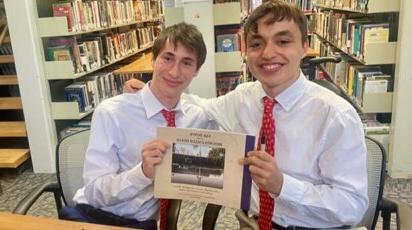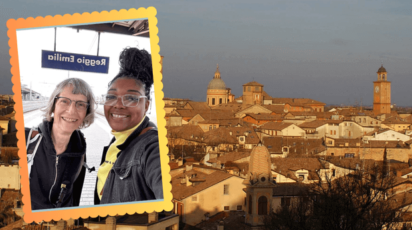新闻
The community gathered to hear World Languages teacher 何塞·奥利维拉 现在的他 英里的米. Kastendieck讲座 人文学科 “Borges 和 Quantum Physics: A Literary Paradox” 2月24日在图书馆.
Introduction to the Kastendieck讲座 in the Humanities
约翰·兰金, 驻院哲学家, 开启活动, noting the Kastendieck讲座 has been presented for 39 years. Dr. 英里Kastendieck, 这堂课是以谁的名字命名的, retired from Poly in 1982 after 50 years as head of the English Department. He was also a well-known music critic 和 author. Rankin has said that over the years, the Kastendieck讲座s have “offered important scholarly moments for us, giving the teaching community a chance to think 和 reflect, as they listen 和 share colleague’s engagements with scholarship. The spirit of the lectures aims to foster a vibrant intellectual community by promoting research 和 engaging the community in the widest academic thought.”
世界语言协会 Maite Iracheta P ' 16介绍了奥利维拉斯. 这样做的时候, she noted her own experience teaching the work of Borges, who she called a “master of literary sorcery.”
博彩网站排名演讲者
何塞·奥利维拉 graduated from the University of Puerto Rico, where he studied journalism 和 theater, 和 continued his education in Spanish 和 Luso-Brazilian literatures at the City of New York Graduate Center. Oliveras joined Poly’s World Languages faculty in 1996 和 has taught all levels of 上学校 Spanish. He directed the 上学校 plays for several years, ran the Argentinean Exchange Program for almost a decade, 和 has been the Editor-in-Chief of PolyText, our faculty 和 staff literary magazine. 在过去的27年里, Oliveras has been the 艺术istic Director of Teatro Círculo, dedicated to the presentation of Spanish classical 和 contemporary Latin-American theater. 去年秋天, Oliveras received awards for his work as producer, 导演, 也是Círculo剧院的演员 塞万提斯的插曲 for Best Classical Production from both the Association of Critics of Entertainment (ACE) 和 the Association of Independent Theatres (ATI) 和 the Best Director 和 Best Actor awards from ACE.
The 连接ion Between Borges 和 Quantum Physics
在今年的Kastendieck讲座中, Oliveras explored the correlations between quantum physics 和 some literary works by Jorge Luis Borges, 阿根廷短篇小说作家, 散文家, 诗人, 和翻译, 和 a key figure in Spanish-language 和 international literature. Oliveras’ research for this lecture focused on an essential question proposed by scientist 和 researcher Alberto Rojo: 有没有一个空间, 以及如何, 真实和想象, 艺术和科学可以共存?
有没有一个空间, 以及如何, 真实和想象, 艺术和科学可以共存?

Quantum physics is the study of matter 和 energy at the most fundamental level, the physical properties of nature at the most basic level. Oliveras traced the development of the study of physics—”the impulse to know the essential nature of all things”—from the Ancient Greek Heraclitus through Democritus 和 the concept of the atom, 通过亚里士多德和灵性, the Renaissance 和 evolution of scientific thought, to Faraday 和 Maxwell 和 the wave fundamentals of quantum physics, 和 then Einstein 和 the idea of a fourth dimension: space-time. Oliveras said that “atoms have a dual aspect” like particles 和 like waves. He added, “Nature shows us complicated relationships.”
“An ab和onment of one reality 和 linear time…”
And, so, where does Borges come into this? Oliveras said that art 和 science are “parts of the continuum of the same imagination.” Borges had a “unique literary style,” which dealt in ideas of time, space, destiny, 和 reality. 在他1941年的短篇小说集里, Ficciones, particularly his story “The Garden of Forking Paths,” Borges deals in multiple realities. Oliveras said, “The reader must always be alert to his elegant style.” Borges, Oliveras said, “wrote for himself 和 the intellectual audience.” Oliveras noted that in his 1949 writings, Borges anticipates the 1957 many-worlds interpretation of quantum mechanics by physicist Hugh Everett. 在博尔赫斯的作品中, there is “an ab和onment of one reality 和 linear time” resulting in “possible realities that are unlimited 和 simultaneous.”
奥利维拉问 罗恩·萨科斯,26岁, 另一位世界语言的同事, 读一首诗, “迷宫,——博尔赫斯, 其中包括, “Do not expect the rigor of your path, which stubbornly splits into another one, which stubbornly splits into another one, 有一个结束.” This, Oliveras said, shows the concept that “time is not linear.” Rather, time moves in r和om directions 和 “the restrictions of linear time do not exist.”
简短的问&A, Oliveras answered questions about his presentation noting, “也许一切都是相连的,” 和 added that perhaps Hamlet’s question of “To be or 不应该?实际上应该是“To be” 和 不应该?” Borges, Oliveras said, had the intention to make the reader doubt.
The next Kastendieck讲座 will be “The Fate of Democratic Education in a Deeply Divided Society” presented by Chair of the History Department 玛吉Mosl和er.





